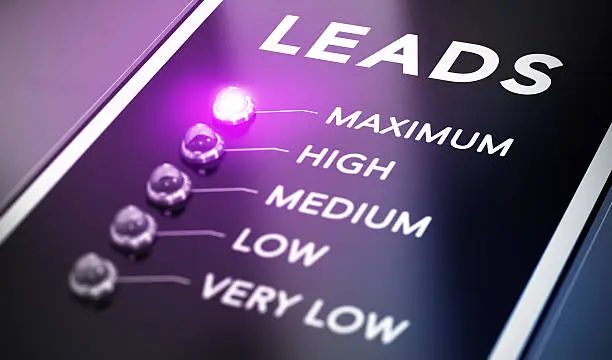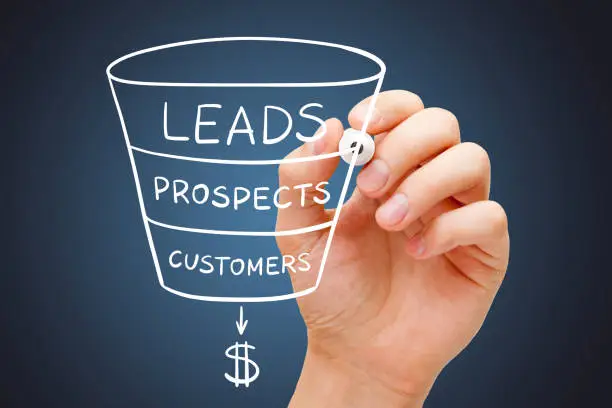Maximizing Real Estate Lead Conversion in 2023
Maximizing real estate lead conversion in 2023 is the key to unlocking business growth and success. In a world where competition is fierce, every lead counts. By understanding the importance of lead conversion, identifying quality leads, building trust, and leveraging technology, real estate agents can significantly increase sales and profits. Ready to boost your real estate lead conversion in 2023? Let’s dive in!
Key Takeaways
Maximize lead conversion rate by understanding leads’ needs, building trust and leveraging technology.
Utilize phone calls, emails, texts and in-person meetings to effectively communicate with leads.
Overcome common challenges and collaborate with other agents to create a systematic plan for success!
The Importance of Lead Conversion in Real Estate

The real estate industry is constantly evolving, and one of the most significant aspects of this evolution is the shift towards online real estate. As a busy real estate agent, adapting to this changing landscape is necessary. This can be done by effectively engaging, capturing, and converting online real estate leads.
Lead conversion refers to the process of turning potential clients – or leads – into actual clients who buy or sell property through your services. The lead conversion rate is the percentage of leads that become clients. A higher rate means more sales and profits.
As a real estate professional, you’re likely part of one of the many real estate teams that work tirelessly to generate and convert leads. In fact, the average conversion rate in the real estate industry is just 1-3%.
But why is lead conversion so important? The answer is simple: without converting incoming leads into clients, your real estate business won’t grow. In fact, it could stagnate or even decline. Maintaining competitiveness and ensuring steady growth requires a robust real estate lead conversion strategy.
So, how can you maximize your lead conversion rate? By understanding the needs and preferences of your leads, building trust, using technology effectively, and employing targeted communication strategies, you’ll be well on your way to converting more leads and ultimately increasing your bottom line.
Identifying Quality Leads

In the real estate business, not all leads are created equal. Some are more promising than others, and focusing your efforts on these quality leads can significantly improve your lead conversion rate. Identifying quality leads in online real estate means understanding their needs, preferences, and readiness to buy or sell. Real estate lead generation plays a crucial role in this process.
The buying process can be challenging for many leads, with issues such as bad credit, a seller’s market, and balancing selling and buying. Recognizing these challenges and providing appropriate support is an important part of a real estate agent’s role.
Similarly, the selling process can be difficult for potential sellers. Motivating them to put their home on the market may involve considering the current housing market. Finding the right time to list, and instilling confidence in the process are also important.
One effective way to identify quality leads is by asking questions that help qualify them. Some examples include their budget, desired location, and preferred property features. Additionally, creating compelling content that demonstrates your ability to solve their real estate challenges can help. These actions move leads down the sales funnel and closer to conversion.
By focusing on all the leads and nurturing them throughout the buying or selling process, you’ll increase your chances of converting them into clients. This will ultimately boost your real estate lead conversion rate and growing your business.
Building Trust with Leads

Building trust with leads is a crucial component of the lead conversion process. When leads trust you as a real estate agent, they’ll be more likely to choose you as their representative in their real estate transaction. So, how can you build trust with your leads?
The first step is to fully understand the objectives of your leads and provide the necessary support. Always have their best interests in mind and be of value and service. Starting a conversation with a meaningful question or a personalized approach can make a lead feel appreciated and more likely to engage.
Nurturing leads is another essential aspect of building trust. This involves consistently following up, crafting personalized emails, and recognizing multiple customer touch points to make leads feel valued. By addressing their concerns and providing relevant, helpful information, you can enhance their experience. You can also demonstrate your commitment to helping them achieve their real estate goals.
Lastly, offering exciting and valuable content such as related products, helpful articles, or sponsored content can further solidify your position as a trusted real estate professional. By building trust with your leads, you’ll not only boost your lead conversion rate but also create long-lasting, loyal client relationships.
Utilizing Technology for Lead Conversion
Technology has revolutionized the real estate industry, and utilizing it effectively can significantly enhance your lead conversion efforts. Some tools to consider are:
CRM systems, which can help you manage and track your leads
Automated email campaigns, which can nurture leads and keep them engaged
Social media platforms, which can help you reach a wider audience and generate leads
By leveraging these tools, you can streamline your lead management and nurturing processes. This makes it easier to manage and convert leads more efficiently.
CRM systems, like FollowUpBoss, are particularly helpful for real estate professionals looking to optimize their lead conversion. These systems offer powerful lead nurturing tools and help you stay organized and focused on your clients’ needs.
Social media platforms are another invaluable resource for lead conversion. Given that 46% of Realtors view social media as a paramount tool for generating leads and maximizing success, a strong presence on platforms like Facebook, Instagram, and LinkedIn is vital.
Email campaigns, especially drip campaigns, can also play a significant role in nurturing leads and keeping them engaged. By sending personalized, relevant content throughout the buying or selling process, you can ensure that your leads remain interested and informed.
By embracing technology and incorporating it into your lead conversion strategy, you’ll be better equipped to manage and convert leads. This, in turn, means driving your real estate business forward.
Effective Communication Strategies
Effective communication is at the heart of successful lead conversion. By employing various strategies, such as phone calls, emails, and text messages, real estate agents can maintain regular contact with leads and guide them through the buying or selling process.
These strategies can be used to nurture real estate leads, build relationships, and ultimately convert them into customers
Phone Calls
Phone calls allow for personalized communication, helping to establish rapport with leads and increasing the likelihood of conversion. By enthusiastically introducing yourself and offering guidance through the buying process, you can demonstrate your unique skills. By taking these actions, you convey your commitment to helping leads achieve their real estate goals.
Email Campaigns
Email campaigns can be used to provide valuable information, updates, and resources to leads, keeping them engaged and informed throughout the process.
By sending personalized, relevant content, you can ensure that your leads remain interested and informed. This will positively affect your lead conversion rate.
Text Messaging
Text messaging offers a quick and convenient way to stay in touch with leads, providing timely updates and reminders. By keeping communication concise and providing an incentive for leads to reach out, you can effectively maintain contact and increase the chances of conversion.
In-Person Meetings and Events

In-person meetings and events, such as open houses and networking events, play a significant role in building trust and rapport with leads. These face-to-face interactions provide a unique opportunity to demonstrate your expertise. They also help to showcase your personality and develop a personal connection with potential clients.
Open houses are particularly effective for engaging with leads and converting them into clients. By hosting or attending open houses, you can showcase properties, answer questions, and address any concerns that leads may have. This personal interaction helps to build trust and credibility, ultimately increasing the chances of conversion.
Networking events, on the other hand, can help expand your professional network and provide a platform for collaborating with other real estate agents. By attending industry events and engaging with fellow professionals, you can gain valuable insights, share resources, and learn from the experiences of others. This collaborative approach can further enhance your lead conversion efforts, especially when participating in events organized by a national association.
In summary, actively participating in in-person meetings and events can significantly boost your lead conversion rate. This is accomplished by building trust, demonstrating expertise, and fostering collaborative relationships with other real estate professionals.
Tracking and Analyzing Lead Conversion Metrics

For optimizing your lead conversion strategy, monitoring and analyzing lead conversion metrics is a requirement. By monitoring metrics such as conversion rates, cost per lead, and return on investment, you can identify areas for improvement and make data-driven decisions to enhance your lead conversion efforts.
Utilizing powerful software tools such as CRMs, analytics platforms, and marketing automation tools can help you track and analyze lead conversion metrics effectively. With these tools, you can gain valuable insights into the performance of your lead generation and conversion strategies. This ultimately helps you make informed decisions to maximize your success.
By monitoring lead conversion metrics, you can also identify potential opportunities for growth and expansion. For example, if you notice that a specific marketing channel is generating a high number of leads, you may choose to invest more resources into that channel to further increase your lead volume and lead conversion rates.
As you can see, tracking and analyzing lead conversion metrics is crucial for real estate agents looking to optimize their lead conversion strategies. By identifying areas for improvement and making data-driven decisions, you can maximize your chances of converting leads into clients and grow your real estate business.
Overcoming Common Lead Conversion Challenges

Converting leads into clients can be challenging. By understanding common lead conversion challenges and implementing effective solutions, you can significantly improve your conversion rate. One common challenge faced by real estate agents is demonstrating their value to potential clients.
Developing a unique selling proposition (USP) that articulates your value and the benefits of working with you is a key step to overcome this challenge. A strong USP can help differentiate you from the competition and attract your ideal audience.
Implementing marketing strategies that showcase your USP, such as targeted email campaigns, social media content, and engaging blog posts, can help convey your value to potential clients and improve lead conversion.
Another common challenge is addressing the concerns and objections of leads. By understanding the needs and preferences of your target audience, you can tailor your communication strategies to address these concerns effectively. For example, you might:
Provide information on the local housing market
Offer guidance on the buying or selling process
Share testimonials from past clients to demonstrate your expertise and commitment to client satisfaction
In summary, overcoming common lead conversion challenges requires a clear understanding of your target audience. It gives you the ability to adapt your communication strategies accordingly. By addressing these challenges head-on and implementing effective solutions, you can significantly improve your lead conversion rate and grow your real estate business.
Collaborating with Other Agents

Collaborating with other real estate agents can have a significant impact on your lead conversion efforts. By working together, you can:
Share resources
Leverage the expertise and connections of others in the industry
Expand your network
Increase your chances of converting leads into clients.
One way to collaborate with other agents is by participating in networking events and industry conferences. These events provide an opportunity to meet fellow real estate professionals, exchange ideas, and forge valuable partnerships. By working together, you can pool your resources, share leads, and learn from each other’s experiences and successes.
Another avenue for collaboration is through referrals. By developing relationships with other agents, you can refer clients to one another when appropriate. This helps to increase lead conversion for both parties. It creates a mutually beneficial arrangement that not only helps grow your business, but also improves client satisfaction by connecting them with the right agent for their needs.
In conclusion, collaborating with other agents can be a powerful tool for maximizing lead conversion in the real estate industry. By expanding your network, sharing resources, and leveraging the knowledge and connections of others, you can significantly improve your chances of converting leads into clients and growing your business.
Creating a Systematic Lead Conversion Plan

To maximize your chances of converting leads into clients, a systematic lead conversion plan is imperative. Implementation of a variety of strategies, like nurturing leads via diverse communication channels, employing technology, and monitoring metrics, helps to create a comprehensive plan enveloping every stage of the buying or selling process.
To create an effective lead conversion plan, follow these steps:
Identify your target audience and their needs, preferences, and readiness to buy or sell.
Develop a communication strategy that includes phone calls, emails, and text messages to maintain regular contact with leads.
Guide leads through the buying or selling process by providing relevant information and addressing their concerns.
By following these steps, you can increase your chances of converting leads into customers.
Next, leverage technology to streamline your lead management and nurturing processes. CRM systems, automated email campaigns, and social media platforms can help you stay organized, track lead progress. They ensure consistent communication with leads throughout the buying or selling process.
Finally, monitor and analyze lead conversion metrics to identify areas for improvement and make data-driven decisions to optimize your lead conversion strategy. By tracking metrics such as conversion rates, cost per lead, and return on investment, you can fine-tune your strategies. In doing so, you maximize your chances of converting leads into clients.
Summary
In conclusion, maximizing real estate lead conversion in 2023 is essential for business growth and success. By understanding the importance of lead conversion, identifying quality leads, building trust, utilizing technology, and employing effective communication strategies, you can significantly increase your lead conversion rate and grow your real estate business. With a systematic lead conversion plan in place, you’ll be well-equipped to face the challenges and seize the opportunities that lie ahead in the ever-evolving world of real estate.
For all the answers you need on seller lead generation, see our blog: https://www.quickcommissionadvance.com/blog/2023-strategies-for-generating-real-estate-seller-leads/
Frequently Asked Questions

What’s a good lead conversion rate in real estate?
Real estate agents typically self-report a customer conversion rate of 3-5%, however, the National Association of Realtors® has revealed that the true rate is closer to 0.4% – 1.2%. This means that the reported conversion rate is significantly higher than the actual rate. This discrepancy can be attributed to a variety of factors, such as agents overestimating their success or not accurately tracking their customer conversion rate. It is important for agents to be aware of the true customer conversion rate in order to take the appropriate actions.
How do you convert leads into clients in real estate?
Reach out quickly, ask open-ended questions to qualify the lead, offer them legitimate support and implement a nurturing system – these are the steps you can take to convert leads into clients in real estate. These steps can help you build relationships with potential clients and increase your chances of closing a deal. You can also use automated emails and other marketing tools to stay in touch with leads and keep them engaged. By following these steps, you can ensure that your leads are more likely to become clients.
What is the average lead conversion rate on Zillow?
Zillow’s lead conversion rate averages around 3 to 5 percent, so success ultimately depends on your effort, skills, and systems. Creating an effective lead conversion system requires a combination of strategy, tactics, and technology. You need to understand the customer journey, create compelling content, and use the right tools to track and optimize your efforts.
How can I identify quality leads?
To identify quality leads, focus on their needs and readiness to buy or sell, understanding which ones have the greatest potential for conversion. Utilizing a motivating tone and avoiding irrelevant facts in answers will also help you connect with potential buyers or sellers.
What technology can I use to maximize my lead conversion efforts?
Maximize your lead conversion efforts with CRM systems, automated email campaigns, and social media platforms.







